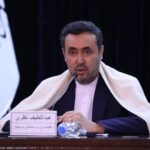An OCHA director in the operations and advocacy division, Reena Ghelani, said the organization has established a new system to monitor the humanitarian aid process in order to prevent corruption.
Reena Ghelani, who is leading a nine-member delegation of the UN, which has arrived in Kabul to monitor the distribution of humanitarian aid, made the remarks in a special interview with TOLOnews.
She said that they are working with 180 Afghan and international organizations to conduct a transparent aid process.
Ghelani urged the international community to support the people of Afghanistan.
“Absolutely, the United Nations and its partners—its NGO partners—we have asked for $4.4 billion dollars, which we do not have yet, we need to raise this money because we need to urgently get assistance to people. We saw horrible nutrition…. We saw children begging to go to school, both boys and girls,” she said.
A member of the delegation said that there is a need to work with the local communities and organizations to provide aid for the people.
“We urge the Biden administration to work in close collaboration with (the) Afghans, especially women and local organizations…” she said.
This comes as many Afghans have voiced concerns over what they called the unfair distribution of aid.
What are the necessary steps to be taken for countering corruption in the distribution of aid?
“If the aid was provided in cash, it would help the value of the Afghan currency and would solve the cash problems in the markets,” said Abdul Naseer Rishtia, a university professor.
“The government should assess the aid provided by the UN. The contracts of the UN organizations should be shared (with the government) and the government must investigate it to see if the aid is provided to the people who deserve it,” said Muzamil Shinwari, an economist.
Afghanistan has recently seen a dire humanitarian crisis with millions of people struggling with starvation.













